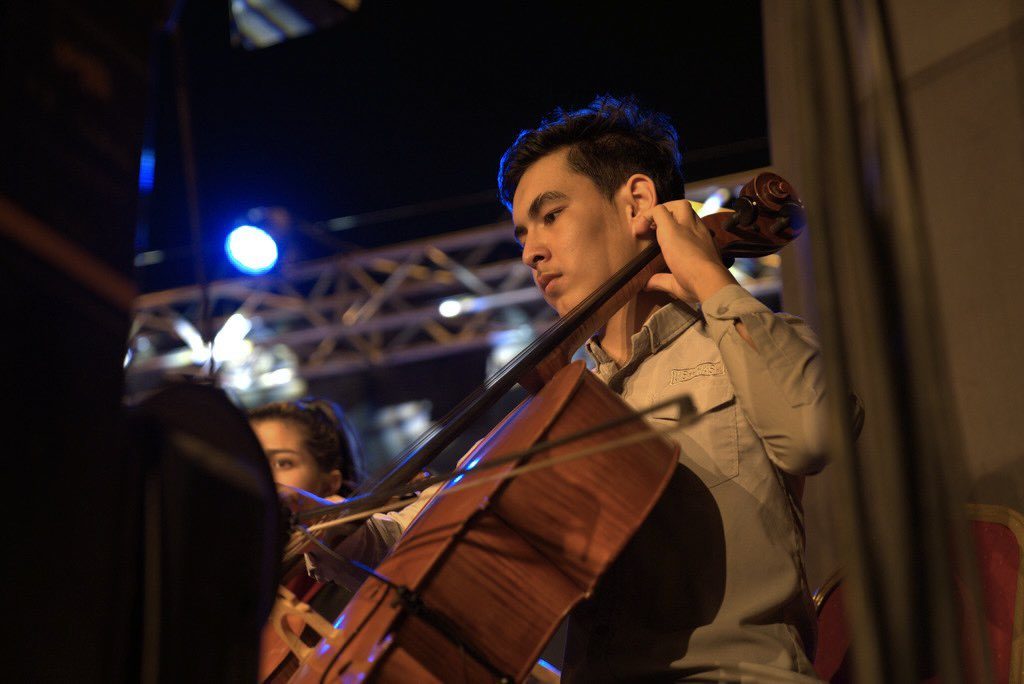Musicians in Afghanistan have been left in fear since the Taliban captured control of the country.
When the Taliban took over Afghanistan in August, the once vibrant Afghanistan National Institute of Music’s [ANIM] classrooms suddenly flatlined and were left empty of all people and sound.
Piano keys, violin strings, and drums that only knew how to entertain were silenced with the blink of an eye.
Two months later, the Afghan orchestra stepped out to greet a public audience for the first time, though on this occasion, it was on a foreign land far from home.
Earlier this week, in the middle of the Qatari capital Doha, ANIM joined up with Qatar’s Armed Forces to collaborate in a live performance at the Park View Compound – which has over the past few months welcomed some of the world’s most senior officials keen on visiting Afghans evacuated from their home country.

“Of course for a musician it’s a gift to finally get the chance after two months to come out from the darkness and play in the light for a chance to perform music once again and send the message of love and peace to the world,” ANIM’s artistic director and conductor Qambar told Doha News.
Earlier this month, Qatar facilitated the travel of around 100 students, alumni and faculty members from ANIM to provide them with a safe space before moving on to their final destination in Portugal.
A week ahead of the Taliban’s takeover of Kabul, the musicians were rehearsing for a tour in Colombia, but their plans were forced to change after the militants took the reins.

Founded by Ahmad Sarmast, the ANIM was inaugurated in 2010 and has since enrolled hundreds of students of all genders and economic backgrounds to ensure equal access to musical education.
Over 35% of the ANIM student body is female and almost 60% of all students come from economically disadvantaged families. The institution surfaced as Afghanistan’s art and music scene flourished over the past 20 years.
However, the group was made to instantly leave its facilities in fear of repercussions from the militant group.

For the past two months, women, former officials, artists and even sports athletes have been living with uncertainty due to the Taliban’s strict interpretation of Islam. When the Taliban ruled Afghanistan in the late 90s, such professions were banned and anyone found to engage in such activities would be punished.
“Music does not know borders…our message has always been to keep humanity alive,” said Qambar.

Sarmast himself was in self-exile for years during the militants’ former rule and only returned to Afghanistan to assess the situation on the ground. He then established the Revival of Afghan Music [ROAM] project.
Before he knew it, and following discussions with the former Afghan authorities keen on reviving the music scene in the country, the initiative morphed into ANIM.

The institution, known for its inclusiveness, has gained global acclaim with performances as far as the United States and across Europe and received support from the World Bank, the German Foreign Office, and the National Association of Music Manufacturers [NAMM].
Despite the Taliban making promises of a more moderate rule this time round, developments on the ground in Afghanistan have indicated otherwise.

According to the Associated Press [AP], the ANIM’s building is now guarded by fighters from the Haqqani network, who are among the Taliban’s loyalists and hold some positions in the new Taliban-led interim government.
Fighters told the news agency that they are awaiting orders from the new government to clarify whether music will be officially banned.
Read also: 100 musicians onboard Afghan flight to Doha
For now, the once soulful classrooms leave behind instruments that have gathered dust in their loneliness. Outside of the Afghan borders, members of ANIM remain determined to share their talent and gift of music with the world.
“Afghanistan deserves peace, deserves happiness, deserves love,” said Qambar.
Follow Doha News on Twitter, Instagram, Facebook and Youtube







